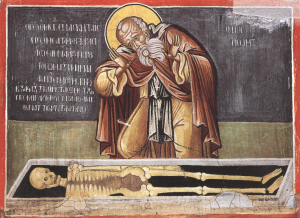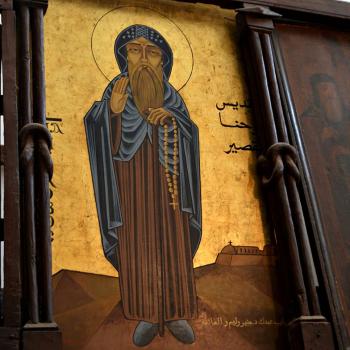
We are called to pray without ceasing, and in this way, we can and should have God and God’s presence with us in all that we do. If and when we find ourselves able to do this, and to be sure, it is something which most will not likely be able to do outside of the eschaton, we should not become prideful, thinking it makes us better than those who have not. We should be humble, not proud. Our pride and vainglory can turn that presence against us, as they will influence the way we experience that presence, causing us not to experience it as love but as wrath. God seeks to purify us all, putting all that is defiled, including and especially all our sinful attachments, into the fire, as as it were. Thus, if we hold onto pride, vainglory, or the like, when we find ourselves in the presence of God, we will experience that purgative work of God. Thus, no matter how much we pray, no matter how much we have God ever before us in our thoughts, we must realize, this does not make us great, which is what Abba Sisoes explained to a monk who came to him, possibly bragging about the way God was always present with him in his thoughts:
A brother said to Abba Sisoes, ‘I am aware that the remembrance of God stays with me.’ The old man said to him, ‘It is not great thing to be with God in your thoughts, but it is a great thing to see yourself as inferior to all creature. It is this, coupled with hard work, that leads to humility.’[1]
It is traditional to tell those full of pride or vainglory that they really are not as great as they believe themselves to be. They are told that they should reflect upon the transcendent glory of God and how far they are from that glory. They are told to avoid comparing themselves with their neighbor, thinking in and through such comparison, how much better they believe themselves to be than everyone else; rather, they are to look to themselves, to ponder their imperfections, and indeed, to think of themselves as the first among sinners, following the example of St. Paul. Care must be had so that such self-criticism does not go against its proper purpose, which is to encourage transformation and improvement; if it leads someone to despair, they can end up becoming nihilistic and self-destructive, seeking the elimination of themselves from all existence, thinking they have no good in them, nothing worth saving. Everyone has good in them. We must not question God’s love for us, but rather, we must counter all our judgmental attitudes towards others, especially if we end up questioning God’s love for them; looking to ourselves, seeing how we need grace, should help us understand how everyone needs the same grace which we ourselves receive.
Thus, instead of looking at others in order to find reasons to criticize them, or worse, lessen their worth, we should be examining ourselves, being critical of ourselves, acknowledging our own imperfections, so that we can focus on our need to change for the better. Such change is going to take a lot of work by us, but it will also require us to open up to and cooperate with grace. We should seek to become “slaves of righteousness” (Rom. 6:18), yielding our “members to righteousness for sanctification” (Rom. 6:19b RSV). Being a slave of righteousness must be understood as a metaphor, one telling us that we must focus on and follow the way of righteousness instead of its opposite; it must not be used to deny our freedom or our free will, thus, it must always be seen as a decision we make, a choice we make, instead of it being forced upon us. In that way, we can overcome the wages of sin and instead accept and receive the “free gift of God” which is “eternal life in Christ Jesus” (Rom. 6:23b RSV).
It is vital for our own spiritual transformation, for our own purification and perfection, for our own theosis, that we embrace God with faith, knowing that in and through such faith, God will give us all the grace we need. Having God present to us in our thoughts is not enough. We need to engage God. We need to work out our salvation. We need to take the grace found in God’s presence and use it to our advantage, that is, to allow it transform us, working for our perfection, trusting that through it, God’s will eventually will be done in our lives. We need to be patient with ourselves, accepting it will take time for us to overcome all our bad habits, habits which keep us trapped in the way of sin. We need to imitate the faith of the Centurion who said, “Lord, I am not worth to have you come under my roof; but only say the word, and my servant shall be healed” (Matt. 8:8b RSV). Let us, therefore, trust that God will provide what we need, that God’s grace is truly sufficient, but doing so in and with the humility of the Centurion, knowing that it is because God loves us and finds us of worth that God will give us (and everyone else) the grace we need. That is, we must acknowledge that our transformation and perfection, our theosis, is not accomplished by us all by ourselves, nor that God gives us such grace because we have been found worthy of it in a way others have not, but because God loves us and wants the best for us as with the best for everyone else.
Abba Sisoes, once a disciple of St. Antony the Great, learned one way to embrace grace; he understood, as icons associated him show, that we are all heading to our earthly demise, that we should keep that end in mind, so that, being mindful of our death, we have the wisdom we need to make sure all our actions work to produce the best end possible for us. In the icon, he is looking down upon the bones of Alexander the Great; upon realizing what happened to Alexander, and his empire, how they perished, he came to understand that every temporal being, no matter how great it is, shall likewise come to an end. Whatever glory they they try to make for themselves in the world, whatever fame and power they have in it, will not last. And, like Alexander, most will likely not be able to enjoy the fruit of all that they have done. Yes, Alexander brought revolutionary changes to the world, some which are extremely important for history and religion, but he himself was too blinded with his desire to conquer the world for him to value the good which he accomplished and to rest in it. Similarly, pride and vainglory keep us attached to various illusions concerning ourselves, so that, through them, we will be led to make all kinds of unsound decisions for our lives. Those who are humble, those who have learned truly what it means to have God in their thoughts, know themselves and therefore, know their need not only for grace, but the need to take the time they have been given to live in as just fashion possible, embracing the gift of live given to them. Finally, it is important to note, following Christ’s resurrection from the dead, we must remember that our final destination is not death, but what lies beyond death: eternity, and the eternal kingdom of God, so that though we shall all have a temporal end, that is only the beginning of a new state of being.
[1] The Sayings of the Desert Fathers. Trans. Benedicta Ward (Kalamazoo, MI: Cistercian Publications, 1984), 214 (Abba Sisoes #13).
Stay in touch! Like A Little Bit of Nothing on Facebook.
If you liked what you read, please consider sharing it with your friends and family!
N.B.: While I read comments to moderate them, I rarely respond to them. If I don’t respond to your comment directly, don’t assume I am unthankful for it. I appreciate it. But I want readers to feel free to ask questions, and hopefully, dialogue with each other. I have shared what I wanted to say, though some responses will get a brief reply by me, or, if I find it interesting and something I can engage fully, as the foundation for another post. I have had many posts inspired or improved upon thanks to my readers.












